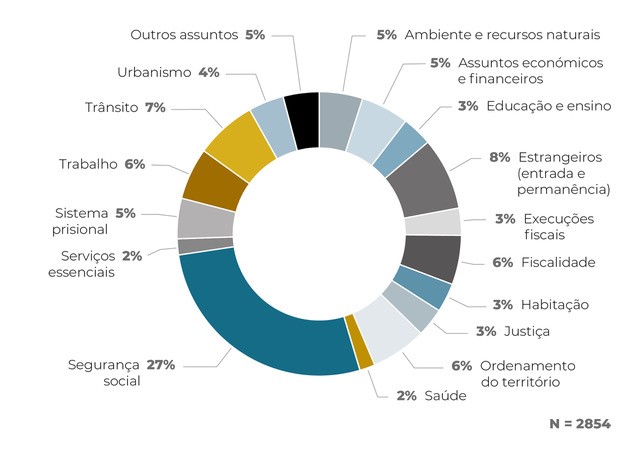Report 2023: Failures in the enforcement of the law and problems generated by the digital transition jeopardise the performance of the Public Administration and lead to citizens’ mistrust of state institutions
Continuing along the lines inaugurated in the previous year, the Ombudsman’s 2023 Activities Report, delivered today to the Portuguese Parliament, gives particular prominence to problems that, across the board and repeatedly, jeopardise the good provision of public services to a wide range of citizens.
Following the emphasis given in the previous report to slowness, lack of coordination between services and poor communication, the 2023 Report identifies two other major problems in the malfunctioning of the Administration, which can lead to distrust on the part of citizens towards State institutions: failures in the execution of the law and the risks of the digital transition, to which several warnings are addressed.
Failures in law enforcement. The daily activity of the Ombudsman’s Office reveals – and the body of work gathered over the years proves this – that it is often not legislation, or the lack of it, that gives rise to citizens’ complaints, but rather the total or partial omission of its execution or application.
The examples selected concern both structural and cyclical measures; they range from social security to taxation; they cover both vulnerable groups and the general public.
For example, in the area of accessibility for people with reduced mobility to public buildings and spaces, the commitment in principle to inclusion and the promotion of human rights has not been accompanied by satisfactory implementation.
There have also been considerable delays, for example, in the convergence of social security systems (announced in 2007) and in the implementation of the reform of the employment, careers and remuneration system (begun in 2008).
Alerts to the digital transition. Notwithstanding its undeniable advantages, the harmful potential of the digitalisation march, especially in relation to the most vulnerable people, has been clearly identified.
The Report sets out some specific warnings, identified on the basis of the analysis of citizens’ complaints: the need for digital systems to be more flexible and more attentive to citizens, and the need to guarantee alternatives to digital access and to meet the expectations generated by digitalisation.
Over the years and in a wide variety of areas, there have been recurrent complaints from users of IT platforms who have been left with the mistaken belief that their requests, declarations or applications have been submitted without this having happened, only to realise this too late.
IT solutions often make use of rigid mechanisms and automatisms that make it impossible to take into account relevant specificities of the case and even lead to errors. The Social Security Institute’s IT system, for example, automatically calculates interest on arrears and includes the respective amount in the amount owed by taxpayers, even when the Social Security is responsible for the delay in the contributions to be paid.
Finally, it should be noted that the existence of services or functionalities that can only be accessed online is a source of particular concern. This is the case, for example, with housing support, essential public services or parcel customs clearance processes.
Subjects of the complaints instructed

On 11 April 2022, the Ombudsman’s Office began operating a new model for handling complaints, with a unit dedicated to the preliminary assessment of requests addressed to the Ombudsman, which analyses and sorts them upstream, i.e. before opening the actual procedure for investigating the complaint.
Whenever possible, this unit immediately resolves the complainant’s problem or provides him with information; if necessary, it requests additional information from the citizen so that his complaint can be analysed; if appropriate, it refers him to other entities better suited to resolving the issue.
This procedural change has been achieving the desired results, allowing, on the one hand, a faster and more accurate response to citizens and, on the other, the early detection of problems with systemic potential, i.e. likely to affect a significant number of people.
Over the course of 2023, when 10,641 complaints out of 15,711 requests came to the Ombudsman’s Office, the operation of this unit meant that a very significant number of procedures were not opened and resources were channelled into studying and analysing various dysfunctions from a more structural and comprehensive perspective.
This change resulted in a reduction in the number of complaint procedures dealt with (2854) and, conversely, in a greater number of thematic reports being drawn up: on Inflation Mitigation Measures (May), on Monitoring the Activity and the Process of Extinction of the Aliens and Borders Service (July), and fieldwork was also carried out – 26 visits and 266 interviews with citizens – which was the basis for drawing up the Report on Service in Public Services.
With regard to the subjects of the complaint procedures dealt with, in line with the past, Social Security organisations were the most targeted, while the relative growth in complaints from foreigners is noteworthy, a phenomenon that will tend to increase significantly in 2024.
The Ombudsman’s Report for 2023 also includes a chapter dedicated to requests for a declaration of unconstitutionality addressed to the Constitutional Court. Given that, in the general architecture of the constitutionality monitoring system, citizens do not have direct access to the Constitutional Court, the Ombudsman has always paid special attention to the issues raised by citizens requesting the exercise of this competence, which is constitutionally attributed to him and which must be preserved, also within the institutional framework.
Finally, a summary is given of the Ombudsman’s national and international activity as a National Human Rights Institution, a status that was renewed following the demanding reaccreditation process, which began in 2023, with a view to assessing and certifying the degree of compliance with the United Nations Paris Principles.
The National Prevention Mechanism (MNP), a department of the Ombudsman’s Office dedicated to the prevention of abusive treatment of people deprived of their liberty and whose activity is, as usual, the subject of its own report, marked a decade of existence in 2023.
That year saw a new dynamic in the participation in training activities aimed at those who have daily contact with people deprived of their liberty or are preparing to work in this field.
n order to reinforce the transparency of preventive action, the main conclusions reached after each visit to a place of detention were made public, indicating the respective risk factors and positive aspects.
In 2023, 44 monitoring visits were carried out and, as usual, the locations were chosen taking into account the risk factors signalled in previous visits, media reports and the content of complaints lodged with the Ombudsman.
With regard to temporary installation centres (CIT) and similar spaces (EECIT), special attention was paid to the transfer of border control powers from the now defunct Aliens and Borders Service (SEF) to the security forces.
The MNP also published a Thematic Report on detention conditions in PSP police stations.
- To read the Ombudsman Report 2023, click here [in Portuguese only].
- To read the MNP Report 2023, click here [in Portuguese only].

Maria Lúcia Amaral has been the Ombudsperson since November 2017
(Gerardo Santos / Global Imagens)
| WHO WE ARE AND WHAT WE DO Get to know us in two minutes by clicking HERE. An independent State body created in 1975, the Ombudsman defends people whose fundamental rights have been violated or who feel harmed by unjust or illegal acts or omissions by the administration or other public authorities. At the same time, it is the National Human Rights Institution and the National Mechanism for the Prevention of Torture, and must ensure that Portugal complies with the United Nations Conventions and Protocols signed in these areas. It provides a free and universally accessible service. Complaints can be submitted by letter, telephone, fax, email or by filling in a specific form. |

